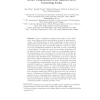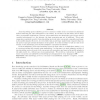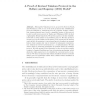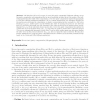172 search results - page 15 / 35 » Black-Box Constructions of Protocols for Secure Computation |
EUROCRYPT
2007
Springer
14 years 2 months ago
2007
Springer
Abstract. Secure computation consists of protocols for secure arithmetic: secret values are added and multiplied securely by networked processors. The striking feature of secure co...
IACR
2011
12 years 7 months ago
2011
A zero-knowledge protocol allows a prover to convince a verifier of the correctness of a statement without disclosing any other information to the verifier. It is a basic tool a...
CJ
2007
13 years 7 months ago
2007
Although the Yahalom protocol, proposed by Burrows, Abadi, and Needham in 1990, is one of the most prominent key establishment protocols analyzed by researchers from the computer s...
EUROCRYPT
2008
Springer
13 years 9 months ago
2008
Springer
Secure multi-party computation (MPC) is a central problem in cryptography. Unfortunately, it is well known that MPC is possible if and only if the underlying communication network...
STOC
2005
ACM
14 years 8 months ago
2005
ACM
We introduce the novel concept of covert two-party computation. Whereas ordinary secure two-party computation only guarantees that no more knowledge is leaked about the inputs of t...




